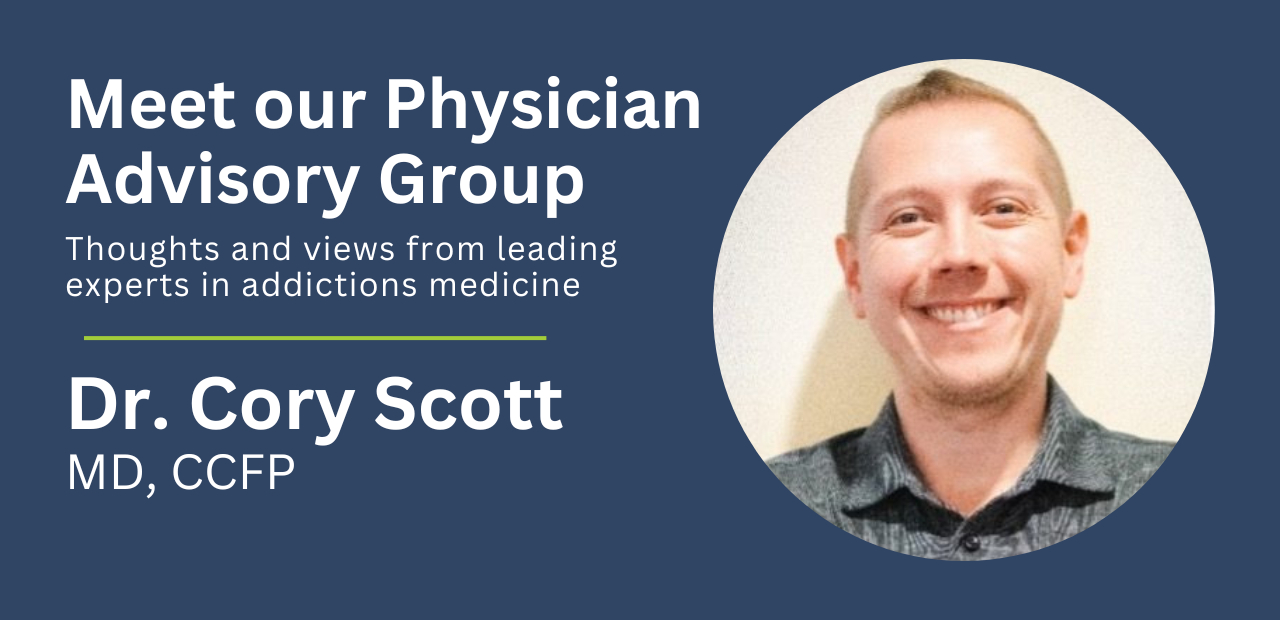PAG Interviews: Dr. Cory Scott
PAG Interviews: Dr. Cory Scott

“My approach and philosophy is simple, to meet people where they are at. Everyone’s goal of treatment is different, and everyone’s motivation to change is different.”
Dr. Cory Scott was recently appointed to our Physician Advisory Group. Comprised of seven leading specialists in addictions medicine, these passionate doctors help guide our outpatient clinical practice, ensuring we stay on the leading edge of rapid access, evidence-based treatment for substance use disorder.
1. What drove you to specialize in addiction medicine? How did you get started in the field?
My interest in addiction medicine began in first-year of medical school while doing an elective with the Shelter Health Network in Hamilton. During this rotation I was exposed to the inequities in the healthcare system, and the significant toll that addictions take on vulnerable populations. Since then I have always had a special interest in addictions medicine, and have since tailored my career to focus on addictions medicine.
2. What are you most proud of in your career?
I am most proud of the positive impact that I have made on people’s lives. It is incredibly rewarding to watch patients go from struggling with an illness to rebuilding their lives, finishing school, working a new job, gaining independence etc… I am always so grateful that I can experience these milestones with my patients.
3. What does being on CATC’s Physician Advisory Group mean to you?
Joining the Physician Advisory Group was a very important milestone for me. I was eager for the opportunity to help drive change in the field of addiction medicine. I am hopeful that this opportunity will allow both personal and professional growth, while improving outcomes in the field of addictions medicine.
4. What advice would you give to someone who is looking to start treatment, or who is worried about a loved one who might be struggling with substance use?
To ask for help, and to know they are not alone. I routinely encounter patients that feel isolated, alone and stigmatized due to their substance usage. The first step towards recovery is asking for help. There are a plethora of treatment options and opportunities, and we are here to help.
5. What makes CATC different, in terms of approach to care and patient outcomes?
What makes CATC different is the vast clinical network of specialists in addiction medicine. There is a focus on treatment outcomes, retention, patient safety and a commitment to help improve addictions medicine within Canada.
6. What is your philosophy and approach in helping people recover from substance use disorder and addiction?
My approach and philosophy is simple, to meet people where they are at. Everyone’s goal of treatment is different, and everyone’s motivation to change is different. I use motivational interviewing to help understand the individual, their goals, their needs, their expectations, and how we can work together to help improve their circumstances.
7. What do you think is the biggest misconception about addiction?
That addiction is a personal choice. This misconception has been perpetuated for decades and even exists within the medical community. Addiction is a disease, and it is important to continue to advocate for change and to help put an end to the stigma of substance usage and addiction.
8. In your view, what is the future of addiction medicine in Canada? How is CATC helping shape that future?
My hope is that healthcare remains an apolitical issue. Unfortunately addictions care has been underfunded, and access to supports such as social work, counsellors, therapy etc. is extremely limited. I am optimistic that there will be increased recognition of the social determinants of health, and better funding to support the individual. CATC continues to advocate for increases in services, and uses our large clinical network and physician group to drive change in the field of addictions medicine
About the Physician Advisory Group
The Physician Advisory Group is an engaged group of highly-specialized physicians with deep expertise in addiction medicine and healthcare policy. Under the leadership of CATC’s Chief Medical Director, they oversee and guide our clinical practice related to Opioid Agonist Treatment across Canada, ensuring we remain on the leading edge of evidence-based substance use disorder treatment and intervention. This is one of the ways we uphold our commitment to our patients to provide best-in-class comprehensive care that meets their needs in response to the continuously evolving landscape of addiction in our communities.